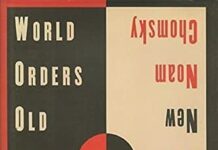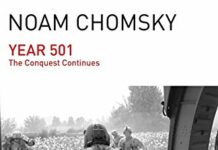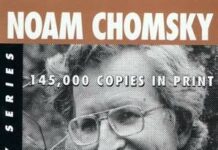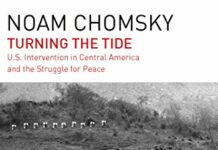
Ebook Info
- Published: 2014
- Number of pages: 490 pages
- Format: PDF
- File Size: 50.44 MB
- Authors: Noam Chomsky
Description
Volume two of the influential study of US foreign policy during the Cold War—and the media’s manipulative coverage—by the authors of Manufacturing Consent. First published in 1979, Noam Chomsky and Edward Herman’s two-volume work, The Political Economy of Human Rights, is a devastating analysis of the United States government’s suppression of human rights and support of authoritarianism in Asia, Africa and Latin America during the 1960s and 70s. Still one of the most comprehensive studies of the subject, it demonstrates how government obscured its role in torture, murder and totalitarianism abroad with the aid of the news media. In the first volume, Chomsky and Herman focus on US terror in Indochina. In volume two, After the Cataclysm, the authors examine the immediate aftermath of those actions, with special focus on the Khmer Rouge takeover of Cambodia. Throughout, the authors track the media response to the US interventions—a mixture of willful silence and Orwellian misrepresentation.
User’s Reviews
Reviews from Amazon users which were colected at the time this book was published on the website:
⭐Chomsky’s book “After the Cataclysm” is a long, tedious attempt to debunk nearly every report of atrocities by the Khmer Rouge. He portrayed the Cambodian genocide as a media hoax. He grudgingly and briefly admitted that there may have been some occasional unjustified violence by the Khmer Rouge, but he dismissed such violence as normal excesses that occur during revolutions. No big deal to him. His book attacks reporters and the media in general, not the Khmer Rouge. No genocide, according to him.
⭐Excellent follow up by Chomsky to the Washington Consensus. Critical to understand how foreign policy worked in the Vietnam/Cambodia days, as history does repeat itself (I.e., so long as we still have capitalism, we will continue to have imperialist wars).
⭐Nowhere does the book praise “Stalinism.” The issue is simply that of a colonial power smashing a national movement. In the 19th Century the prevailing ideollogy might have been Christiandom vs. Islam; by the 1960’s it was the “Free World” vs. “Godless Communism.” The essential power relatons of empire remain the same. To criticise the larger power and its bullying tactics is not to whitewash the other side; but the normal human reaction among the unbrainwashed is to take the side of the little guy fighting for his life over the big fat aggressor.
⭐Ensconced in the ivory tower of American academia, neither Noam Chomsky nor Edward Herman would have survived day one of Cambodia’s infamous “Year Zero” – an “agrarian reform” that led to the deaths of roughly two million people – one quarter of the population of Cambodia. Luckily for Chomsky, the governor of Massachusetts (Chomsky is a linguistics professor at the Massachusetts Institute of Technology in Cambridge, MA) did not summarily round up, torture, convict and execute the intelligensia and bourgeois classes in Massachusetts. Sadly for Cambodia (or Kampuchea, if you prefer) Pol Pot’s Khmer Rouge government did just this in Cambodia. Under the rule of the Khmer Rouge, the “crime” of being an elementary school teacher, to say nothing of being a tenured university professor!, was excuse enough for the revolutionary heroes Chomsky sings the praises of in “After The Cataclysm”, to kill you and your entire family. Chomsky’s book fails in every conceivable way when analyzing the bloody regime of Pol Pot, attempting to write off refugee reports of the unimaginably large scale atrocities as the spin of an imperialist media seeking to defame the agrarian revolution. Chomsky could not have been more wrong, nor proved more valuable a western mouthpiece for one of the most brutal dictators in living memory. The fiery anti-imperialism and anti-colonialism polemics and philippics that were Chomsky’s milieu during the Vietnam war pigeonholed his analysis of the Pol Pot regime, and it shows in this book. After his bitter condemnations of anything even vaguely pro-American in Asian politics, Chomsky had ideologially painted himself into a corner. Rather than renounce one ounce of his invective, he instead wrote this book, which regardless of intent, reads as an apologist eulogy to the Khmer Rouge. I give this book five stars because it’s a five star work on the excesses of the old guard left in American academic circles, and a lingering stench on Chomsky’s reputation. Had Chomsky had the integrity and courage to admit that the emperor Pol Pot had no clothes on, this book never would have been written….The disingenuousness presented in “After The Cataclysm” is nearly too astounding, as if written as a savage and bitter satire of professional academics-cum-polemicists. It’s not, and academia is left tarnished for it.
⭐Slanted. I read this book several decades ago, shortly after it was published in 1978. At the time I was doing some research on human rights in Vietnam and was getting to know Vietnamese “boat people” refugees who had endured incredible hardships under the communist regime and in fleeing the country. But their stories are largely ignored in this book. The authors go after reporters who wrote critically of the post 75 regimes of Indochina while praising the few works written by fellow leftist activists defending the regimes. Inconvenient facts, such as the arrest of leaders of the Unified Buddhist Church of Vietnam, are ignored or dismissed. They further show their contempt for victims of these regimes by comparing them to Nazi collaborators or those who supported England during our revolution. I give the book two stars because the numerous citations may be useful to those doing their own research.
⭐A book that begs us to call into serious question the nature of the society in which we, live. Using examples from postwar Vietnam, Laos, and Cambodia, it presents the broader issue, of “how our system really works”: Government, media, and such.
Keywords
Free Download After the Cataclysm: Postwar Indochina and the Reconstruction of Imperial Ideology (The Political Economy of Human Rights Book 2) in PDF format
After the Cataclysm: Postwar Indochina and the Reconstruction of Imperial Ideology (The Political Economy of Human Rights Book 2) PDF Free Download
Download After the Cataclysm: Postwar Indochina and the Reconstruction of Imperial Ideology (The Political Economy of Human Rights Book 2) 2014 PDF Free
After the Cataclysm: Postwar Indochina and the Reconstruction of Imperial Ideology (The Political Economy of Human Rights Book 2) 2014 PDF Free Download
Download After the Cataclysm: Postwar Indochina and the Reconstruction of Imperial Ideology (The Political Economy of Human Rights Book 2) PDF
Free Download Ebook After the Cataclysm: Postwar Indochina and the Reconstruction of Imperial Ideology (The Political Economy of Human Rights Book 2)





